“Wasl” Newsletter: The Seventh Issue
Two Years since the Launch of Masaar’s Activities in Egypt
It has been two years since Masaar – Technology and Law Community launched its activities in Egypt in 2020. During those two years, Masaar worked on the intersections between technology and law, while focusing on a number of issues including Free Internet, Tech and Equality, Privacy, Decentralization, Human Rights and Business, and Internet Governance. Masaar works on these issues through publishing research and policy papers, studies, and technical and legal guides. In 2021 Masaar started producing “CONNECT” podcast to cover topics related to technology and law. And in 2022, Masaar launched the “ICT Laws Aggregator”. The Laws Aggregator contains 10 laws, in addition to articles of the Egyptian Constitution issued in 2014, and it can be searched through many different classifications. Masaar also publishes “Wasl” newsletter, a non-periodical newsletter on news and activities related to digital rights in Egypt and the Arab region.
Masaar participated in founding the “Arab Alliance for Digital Rights” with a group of organizations operating in the Arab region who believe in a progressive understanding of human rights principles. The Alliance aims to promote and defend internet users’ digital rights and freedoms across Arabic-speaking countries. Masaar also joined the “MENA Coalition to Combat Digital Surveillance” which works to end the sales of digital surveillance tools to repressive governments in the region. Masaar is also a partner in the “Palestine Digital Activism Forum”, and “Bread&Net Forum”, which are annual forums to support digital rights in the Arab region.
Bread&Net in its Fifth Edition Returns as a Festival
Bread&Net receives session proposals for its fifth session until July 10, 2022. For this year, the forum will be held on the Internet, and in person in Lebanon in November 2022.
As Bread&Net 2022 will host a range of in-person networking and community-building events across Beirut. Bread&Net aims to promote and strengthen the local culture of digital literacy, privacy, and security while bringing to light the wider digital rights challenges and opportunities emerging in the Arab region. Masaar is one of the partners of the forum hosted by Social Media Exchange – SMEX.
Activities of Masaar

Internet Governance
Net Neutrality.. What Is It? How Does it Affect Us?
Since the Internet was invented, there have been measures for ensuring that there are certain governing principles to ensure nondiscrimination requirements. The quest to impose restrictions on network operators that compose and offer Internet access, and make sure there is an equal access, as well as non-discriminatory treatment, is called net neutrality. In light of the massive developments in the domain of net neutrality, this paper seeks to provide a comprehensive definition of net neutrality, ascertain the negative impacts associated with its absence, and case studies from a number of countries.
Link for the paper: In English | In Arabic
Internet Governance: An Introductory Overview
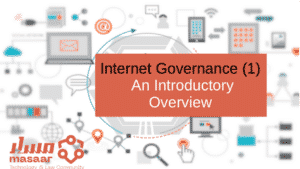
Masaar presents the first part of a series of research papers dealing with concepts, policies, and actors in Internet Governance. This series intends to provide a comprehensive introduction to Internet Governance, approached from the Internet users’ perspective. This user while increasingly dependent on the network in different aspects of his/her life, has turned into a citizen in a trans-national community whose daily life is affected by the different policies set and implemented by a great number of actors. All of this happens under the large title of Internet Governance.
Link for the first part: In English | In Arabic
Decentralization
Blockchain Technology… How Was it Developed and its Uses in Various Fields
There are many benefits to using blockchain technology as it allows for secure, inexpensive, and scalable data management. It also allows you to create smart contracts which can completely replace traditional agreements. This paper discusses the definition of the blockchain and how it was developed, as well as its features and use cases.
Link for the paper: In English | In Arabic
What Do You Know about Open Data? Standards and Applications
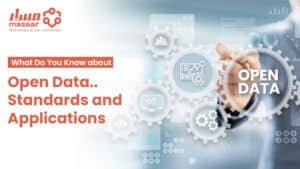
Data is becoming more valuable than ever, and every day there are huge amounts of data collected. But what good is data if it’s not available to the vast majority of people? Maybe because it’s expensive to reach data, or because access to it is limited to certain individuals and bodies? That would be a waste of data. This paper will discuss the concept of open data, its standards, importance, and applications.
Link for the paper: In English | In Arabic
Tech and Law
Works of Technical Expertise in the Light of the Cybercrime Law
Investigating crimes related to information technology and proving digital evidence is a novel topic. The work of technical expertise in information technology issues plays an important role, so this paper aims to review the general rules and regulations related to expertise work, the laws regulating them, and the powers of experts in light of the Anti-Cyber and Information Technology Crimes Law.
Link for the paper: In Arabic
Controls and Procedures for Reconciliation in Information Technology Crimes
This paper refers to the basic rules related to reconciliation in the Anti-Cyber and Information Technology Law in addition to referring to information technology crimes that were not subject to the rules of reconciliation.
Link for the paper: In Arabic
Legislative Contexts for the Passage of Internet Laws
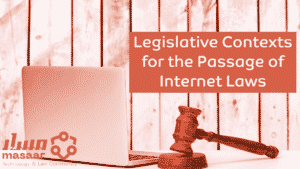
With the acceleration of the issuance of laws related to rights and freedoms on the Internet and laws related to communication technology in general, questions about the reasons and motives associated with the adoption of some of these legislations increase. This paper refers to some of the general features associated with laws related to rights and freedoms on the Internet, without addressing the explanatory readings of these texts, but by addressing different areas that pass between the contexts related to the laws. The paper also aims to review three different models of laws issued from 2015 to 2020, during which the development in the legislative status of laws, related to or linked to rights and freedoms on the Internet, can be monitored.
Link for the paper: In English | In Arabic
Dismissal from Public Office as a Consequential Penalty for Information Technology Crimes
This paper deals with the rules regulating the termination of the service of a public office employee as a result of imposing the penalty of “dismissal from the job” as one of the sub-sanctions stipulated in the Anti-Cyber and Information Technology Laws, with an indication of the legal nature of dismissal from the job in other legislative places.
Link for the paper: In Arabic
Free Internet
Blocking: An Established Censorship Tool in Egyptian Legislation
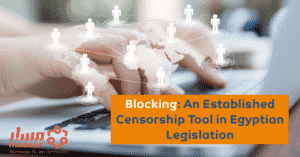
The legislative environment and judicial rulings in Egypt are full of rules and principles related to imposing forms of censorship over contents of different forms, visual, vocal, and read. Naturally, these tools have evolved along with technology, and the increasing role of the Internet in recent years in enriching content, providing alternative platforms, and unlimited accessibility. In parallel, tools of censorship of contents have evolved managing to block access to some of them in addition to blocking access to some services, and though the statement “blocking users” can’t resist technological evolution, it has become an established legal reality in the Egyptian legislative environment.
Link for the paper: In English | In Arabic
Digital Media
Guide to the Press and Media Regulation Law
The Press and Media Regulation Law was issued in 2018. Two years later, it was followed by its executive regulation. The law no. 180/2018 expands the definition of media means. It also includes many rules related to the operation of digital media means, thus this guide aims to explain the most important rules of the law, like the ones concerning administrating private or business-owned pages and accounts, and those regulating the operation of personal or commercial pages and websites.
Link for the guide: In English | In Arabic
How to Produce a Podcast? Tools and Software
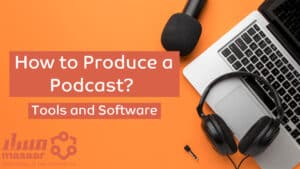
This paper gives a short overview of things you need to keep in mind or on your table when planning or starting a podcast. The manual covers tools, software, educational material, and the general strategy you need to adopt when starting a podcast.
Link for the paper: In English | In Arabic
Why is Data Journalism More Important than Ever?
Data journalism gives everyone the ability to share information and gain insight. We can better understand the world around us by using numbers and facts. It allows us to discover new trends, issues, and patterns. We also have the power to change things for the better. This paper deals with the definition of data journalism, the types of data journalists, the tech tools used in the investigation, and the most crucial training manuals available to journalists.
Link for the paper: In English | In Arabic
Tech and Equality
Obstacles Facing Women in Technology and Initiatives towards a Feminist Internet
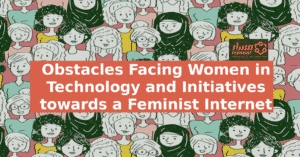
Social issues are always reflected in cyberspace, and their impact and scale become deeper and wider in the case of issues rooted in societies. With the spread of issues such as misogynistic, discriminatory speech, anti-women and LGBTQI+ speech, these problems have found their way into cyberspace as well. So, activists started working to maximize their capacity to address this type of discourse, placing issues related to feminism and LGBTQI+ people as an integral part of cyberspace. This paper discusses the definition of the feminist internet and its principles, with reference to initiatives working to create a feminist internet.
Link for the paper: In English | In Arabic
How to Overcome AI Bias… Techniques and Tools
With the spread of Artificial intelligence (AI) applications in different sectors and societies, the impact of their bias has increased widely, which also increased the need for fair systems that are capable of making, or helping to make, fair decisions that are free from racism and prejudice. This paper discusses practices and tools for reducing AI bias.
Link for the paper: In English | In Arabic
5G Networks and Possible Impacts on Human Rights
This paper includes an explanation of 5G networks, the possibilities and opportunities they provide, and the difference between them and the previous generation networks. The paper also deals with the problems and negative effects of 5G networks, with a focus on the direct positive and negative effects on human rights.
Link for the paper: In English | In Arabic
New on “CONNECT” Podcast (Arabic Audio)

- Episode (9): What is open source? How can countries benefit from it?
Listen to the podcast on: Google Podcasts | Apple Podcasts | Anchor | Masaar Website
- Episode (10): The Gender Data Gap
Listen to the podcast on: Google Podcasts | Apple Podcasts | Anchor | Masaar Website
- Episode (11): Aaron Swartz.. A Life for Internet Freedom
Listen to the podcast on: Google Podcasts | Apple Podcasts | Anchor | Masaar Website
From the Arab Region
- SMEX published an article titled “Digital Censorship and Obstructing Access to Information in Morocco”. The article sheds light on shutting down a government cadastre website in Morocco after a Moroccan investigative journalist conducted a press investigation revealing that nearly 100 Moroccan public officials acquired residential properties on state lands at a fraction of their true cost. The investigation was conducted using the cadastre website.
Link for the article: In English | In Arabic
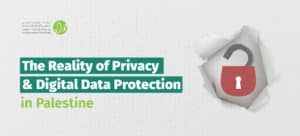
- 7amleh published a study titled “The Reality of Privacy & Digital Data Protection in Palestine”. The study seeks to identify the reality of privacy and protection of digital personal data in Palestine in terms of the collection, processing, and use of Palestinian users’ data.
Link for the study: In English | In Arabic
- Access Now published an article on the targeting of women human rights defenders with Pegasus software under the title “Unsafe anywhere: women human rights defenders speak out about Pegasus attacks”. The article discusses the impact of surveillance on women as governments weaponize personal information extracted through spyware to intimidate, harass, and publicly smear the targets’ reputations.
Link for the article: In English | In Arabic
- The Jordan Open Source Association translated an article titled “Five myths about password managers”. The article introduces password managers software and discusses five myths that cause some users to hesitate to use these programs.
Link for the article: In English | In Arabic
